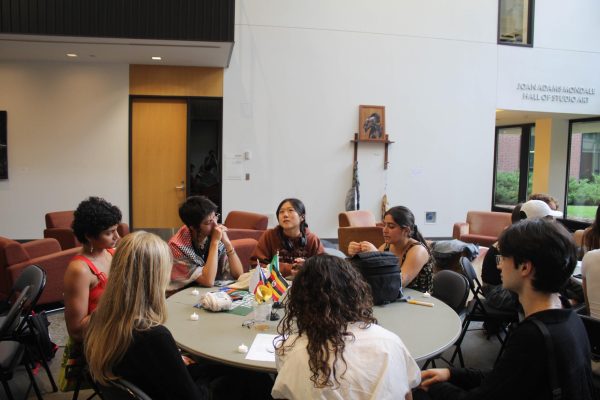Living in the Meritocracy
Photo by Green Chameleon on Unsplash
February 11, 2021
The commodification of Me began when I applied to college my senior year of high school, partaking in the ritual that all Macalester students have undergone. Never before had I so meticulously trotted out the value of myself. It was not new that I had to consider test scores and grades, but it was new that I had to use them to advertise myself. It was new that these numbers placed a measurable value on Me, one that dictated whether colleges would buy Me or choose a different product.
I had to market my hobbies and interests, too, billboard-ing them into precisely 10 activities. Hours per week, weeks per year, in 150 characters. Until then, I had done things because I wanted to do them. Now those too became fundamentals for the asset of Me.
Explicitly assessing the value of what makes up Me in the zero-sum game of college admissions has changed the way that I think about every aspect of myself. It is impossible to undo the realization that I have a worth that will be explicitly compared to other peoples’ worths. It’s also impossible to disentangle this sense of worth from my interests, activities and intellectual life. I’ve become a meritocrat.
The promise of modern meritocracy is simple. If I work hard and correctly optimize my time, pursuing activities with high returns on my time investment, then I can ride my value upwards into the elite. Not just the elite, as in economically secure and socially respected. The elite, as in having a job where work is the means to a fulfilling life. That’s the life I want — or at least the life I’ve learned to want — and so I’ve accepted the promise of meritocracy.
Since my close evaluation of how I spend my free time, I’ve struggled to separate my passions from my aspirations, my life experiences from my resume additions. As Derek Thompson describes in The Atlantic, meritocrats have learned that they ought to find their “calling” and pursue a career that can inform their identity. Indeed, now that I’ve come to understand my involvement in activities as something that enhances my worth, I’ve continued to search for worth and meaning via quantifiable activities. Is a new commitment going to have a worthwhile long-term gain? Is it going to make me more marketable in the competitive worlds of passion-adjacent careers? I can no longer weigh my commitments without these questions putting their thumbs on the scale.
This mindset is further calcifying at Macalester. The liberal arts guarantee is seductive: by taking a diverse spread of classes and enjoying learning for its own sake, I’ll be able to hone in on my passions. This is an unproblematic premise on its own; most Macalester students I know love to learn and explore. But pair it with a nagging voice reminding me that I’ll end up with significant debt in exchange for my intellectual exploration, and I can’t help but come to the conclusion that I better get a job that will incorporate my passions, and therefore make college worth it. I know I’m not alone in this; my peers and I are paying thousands of dollars, largely to examine our curiosities and discover what we most love to do. Facing years of debt, it seems like there’s no choice but to aspire for the elusive job that will both pay well and intellectually satisfy, even if that means toiling away for it.
This an unrealistic aspiration, and it’s likely to create unsustainable lifestyles for myself and my peers. The only way to obtain these types of jobs is through ever more investment in my human capital. In a 2019 Buzzfeed essay, Anne Helen Petersen wrote about this mindset and its deleterious nature: “I knew it [the economic system] was winnable for only a small few. I just believed I could continue to optimize myself to become one of them.” The result? Erosion of work-leisure boundaries, increased anxiety, dissatisfaction and burnout. I’d also include alienation from my own interests. While Petersen’s piece is about millennials currently in the labor market, the argument holds true for Gen Z-ers with an eye on their future careers. It’s a blatantly unhealthy lifestyle, but we devote ourselves to it regardless.
Undoubtedly, my perspective contains a significant degree of socioeconomic privilege. I’m fretting about whether I can find a job that is both well-paying and spiritually fulfilling, not worrying about whether I’ll have food and housing security after graduation. There’s a kind of elitism in this conception of success, too — I don’t know any Macalester students who want to be electricians, although they make similar amounts to journalists and adjunct professors. It is ultimately my own choice to pursue any given career, and so my situation doesn’t call for pity.
But there is something flawed with a system that teaches us to find value in the status and content of our work, even that it comes at great cost to ourselves. This isn’t the way that students and workers should live their lives. There’s value in more than work or hireability, and there are healthier ways to build an identity and find fulfillment. I can’t do much to change the institutions that have made things this way. It’s also difficult to extract myself from the tangle of meritocracy, which now permeates everything I choose to do. How can I take moments to enjoy myself when even my passions are also forms of self-optimization? It’s not an easy question to answer. I can start, however, by acknowledging where I stand. Maybe then I can begin to de-commodify Me.














